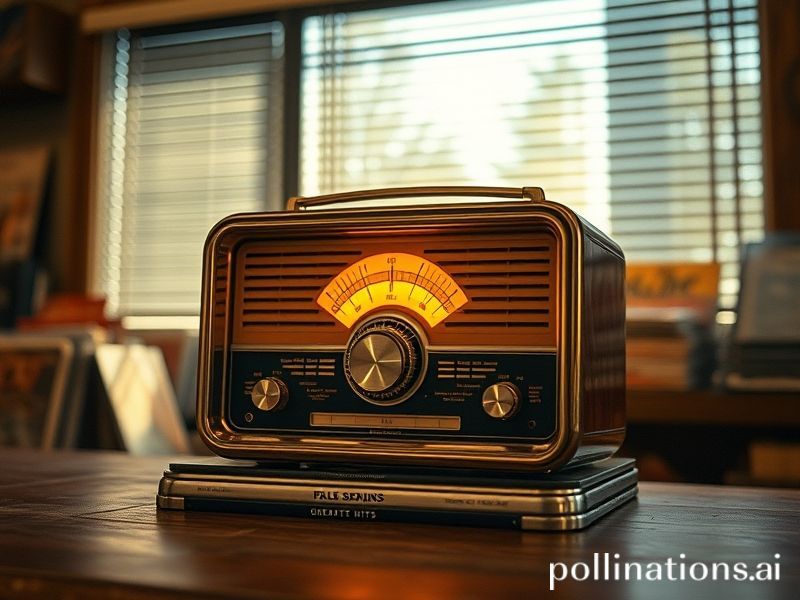Global Greatest Hits: How One Playlist Conquered the World and Stole the Future
Greatest Hits Radio: The Planet’s Collective Nostalgia Loop, Now with Ads for Funeral Insurance
By Our Correspondent Somewhere Between the 80s and Oblivion
There’s a moment, somewhere over the mid-Atlantic, when the in-flight entertainment system offers “Classic Rock Workout” and the opening bars of “Eye of the Tiger” leak from 300 plastic headsets like a motivational hemorrhage. Thirty-five thousand feet below, a container ship steams toward Rotterdam blaring “Take On Me” to keep the Filipino deckhands from remembering the unpaid overtime. In Lagos gridlock, a danfo bus driver rewinds “I Want to Break Free” for the fourth time since breakfast, while a teenager in São Paulo live-streams a lip-sync to the same song, unaware that the algorithmic hand feeding her is the same one strangling new music in its cradle. From Reykjavík to Riyadh, humanity has agreed—without referendum—to power its daily grind with the same forty songs, remastered, compressed, and inserted between ads for debt consolidation and erectile dysfunction.
Welcome to Greatest Hits Radio, the sonic monoculture we never voted for but obediently hum along to, like hostages suffering a particularly catchy form of Stockholm Syndrome.
The numbers, should you require proof of planetary surrender, are brutal. Global FM networks that once prided themselves on local playlists now pipe in pre-curated “heritage” blocks from London or Los Angeles. Dua Lipa gets three minutes of prime time; Fleetwood Mac gets forever. In Jakarta, the government’s own “Golden Memories” station broadcasts “Hotel California” every 47 minutes, presumably to remind citizens that you can check out any time you like, but you can never leave a trade agreement with the West. Meanwhile, the Arctic research station at Svalbard keeps its morale up with a 24-hour loop of “Don’t Stop Believin’,” a cruel joke when the ice outside is, in fact, stopping believing quite rapidly.
The economics are elegant in their malevolence. Royalties for legacy tracks are capped at prehistoric rates; the catalog is already amortized, the stars either dead, detoxed, or too rich to care. Every time “Sweet Child o’ Mine” plays, a private equity firm somewhere books another fractional jet. New artists—those naïve souls still bothering to write fresh hooks—compete for the remaining 14 percent of terrestrial airtime, roughly the same market share allotted to artisanal yak cheese. The result: a planet where the future of music is crowdsourced on TikTok, then immediately licensed to cruise lines so Grandma can shuffle-dance to a sea-shanty remix of “Africa” by Toto.
Culturally, the implications are darker than a Norwegian December. When everyone from Nairobi taxi drivers to Norwegian fishmongers knows the words to “Livin’ on a Prayer,” we achieve a sort of forced Esperanto—except the vocabulary tops out at “Whoa, we’re halfway there.” Shared nostalgia is marketed as unity, but it’s really pacification: why agitate for change when Bon Jovi has already provided the illusion of triumph for three minutes and forty-five seconds? The same trick worked for empires in the 19th century, only they had to ship brass bands; now Spotify does it for free, minus the dysentery.
Even geopolitics has tuned in. Russian state radio counters Western sanctions by spinning “We Will Rock You” before the hourly propaganda bulletin, presumably to soften the announcement that sugar will be rationed until further notice. In Beijing, the Belt and Road initiative has a soft-power playlist: “Money for Nothing” piped into the lobbies of African rail terminals built on Chinese loans. And when COP delegates need a breather from doomsday graphs, the PA system in Glasgow treated them to “Walking on Sunshine,” an act so tone-deaf it could have been sponsored by Exxon.
We are, in short, stuck on repeat. The same chorus echoing from tinny smartphone speakers, rooftop bars, and refugee-camp radios serves as both lullaby and dirge: a reminder that we once imagined tomorrow, then sold the rights to a hedge fund. Perhaps the cruelest irony is that the songs themselves were often written by young people desperate to escape—escape factories, suburbs, small towns—only to become the soundtrack to our global resignation.
So next time you catch yourself whistling “Don’t You (Forget About Me),” consider the possibility that the plea is literal. The machine will keep spinning until the last glacier calves, the last FM tower rusts, and the final cockroach learns the bassline to “Another One Bites the Dust.” Until then, cue the commercials: life insurance, payday loans, and—why not—tickets for the farewell reunion tour. After all, nostalgia is the one resource we’re not running out of.







